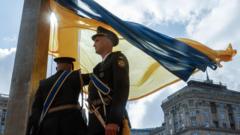The Kursk nuclear power facility in Russia's western region is at the center of recent tensions, with Russian officials attributing a fire there to Ukrainian drone attacks. The incident allegedly occurred overnight and reportedly damaged a transformer, although there were no injuries, and radiation levels remained normal, according to the plant's press service via Telegram.
Simultaneously, claims were made regarding up to 10 Ukrainian drones being intercepted near Ust-Luga, a significant fuel export terminal in the Leningrad region. The regional governor indicated that debris from these drones ignited a fire, which firefighters addressed promptly. Ukraine has yet to respond to these accusations.
As this unfolds, the United Nations' International Atomic Energy Agency (IAEA) continues to emphasize the need for both nations to exercise maximum caution around nuclear sites during the ongoing conflict.
The backdrop of these developments coincides with Ukraine's celebration of Independence Day, commemorating its separation from the Soviet Union in 1991. Adding to the significance, Canadian Prime Minister Mark Carney arrived in Kyiv to reaffirm support for the Ukrainian government, engaging in discussions with President Volodymyr Zelensky. Both leaders plan to hold a joint press conference to address ongoing support from Canada.
Zelensky shared a heartfelt message from King Charles, which acknowledged the resilience of the Ukrainian people amid the trials of war, providing a morale boost as the nation confronts significant challenges. The UK government echoed this sentiment by symbolically flying Ukrainian flags above Downing Street and committing to continue training Ukrainian soldiers through Operation Interflex until at least 2026.
Norway also announced its intention to provide approximately 7 billion kroner in air defense systems to bolster Ukrainian security efforts, highlighting a collaborative international response to the conflict. Norwegian Prime Minister Jonas Gahr Støre noted this partnership with Germany in enhancing Ukraine's military capabilities.
In a related development, Russia's forces have reportedly captured two villages in the Donetsk region, where Russian advances are described as slow and costly. The implications of these territorial changes and their effects on international negotiations have been a focus, particularly following a high-profile meeting between U.S. President Donald Trump and Russian President Vladimir Putin earlier this month aimed at facilitating peace in Ukraine.
Nonetheless, Zelensky has maintained calls for an unconditional ceasefire, contending that Russia is actively seeking to hinder peace negotiations. Russian Foreign Minister Sergei Lavrov cautiously stated that any meeting between Putin and Zelensky would require a mutually agreeable agenda, which has yet to be established—a point Zelensky disputes, accusing Russia of prolonging the conflict rather than seeking resolution.
Simultaneously, claims were made regarding up to 10 Ukrainian drones being intercepted near Ust-Luga, a significant fuel export terminal in the Leningrad region. The regional governor indicated that debris from these drones ignited a fire, which firefighters addressed promptly. Ukraine has yet to respond to these accusations.
As this unfolds, the United Nations' International Atomic Energy Agency (IAEA) continues to emphasize the need for both nations to exercise maximum caution around nuclear sites during the ongoing conflict.
The backdrop of these developments coincides with Ukraine's celebration of Independence Day, commemorating its separation from the Soviet Union in 1991. Adding to the significance, Canadian Prime Minister Mark Carney arrived in Kyiv to reaffirm support for the Ukrainian government, engaging in discussions with President Volodymyr Zelensky. Both leaders plan to hold a joint press conference to address ongoing support from Canada.
Zelensky shared a heartfelt message from King Charles, which acknowledged the resilience of the Ukrainian people amid the trials of war, providing a morale boost as the nation confronts significant challenges. The UK government echoed this sentiment by symbolically flying Ukrainian flags above Downing Street and committing to continue training Ukrainian soldiers through Operation Interflex until at least 2026.
Norway also announced its intention to provide approximately 7 billion kroner in air defense systems to bolster Ukrainian security efforts, highlighting a collaborative international response to the conflict. Norwegian Prime Minister Jonas Gahr Støre noted this partnership with Germany in enhancing Ukraine's military capabilities.
In a related development, Russia's forces have reportedly captured two villages in the Donetsk region, where Russian advances are described as slow and costly. The implications of these territorial changes and their effects on international negotiations have been a focus, particularly following a high-profile meeting between U.S. President Donald Trump and Russian President Vladimir Putin earlier this month aimed at facilitating peace in Ukraine.
Nonetheless, Zelensky has maintained calls for an unconditional ceasefire, contending that Russia is actively seeking to hinder peace negotiations. Russian Foreign Minister Sergei Lavrov cautiously stated that any meeting between Putin and Zelensky would require a mutually agreeable agenda, which has yet to be established—a point Zelensky disputes, accusing Russia of prolonging the conflict rather than seeking resolution.
















